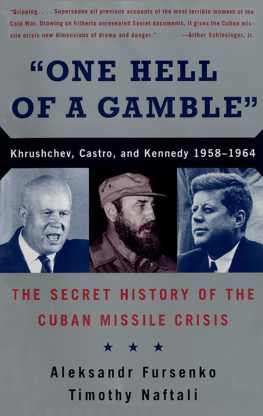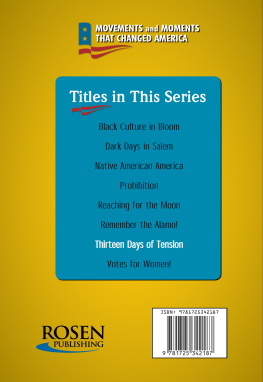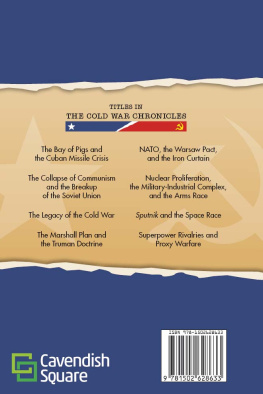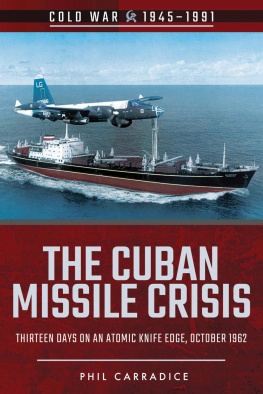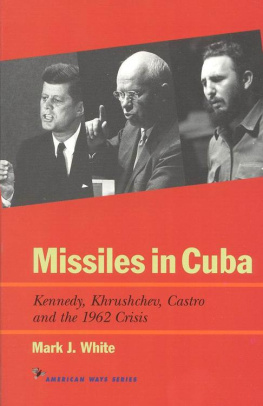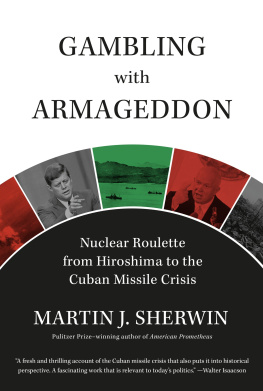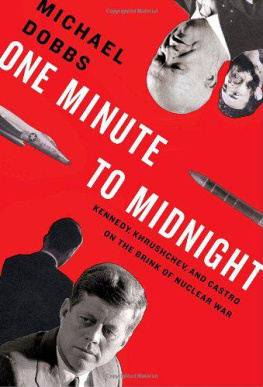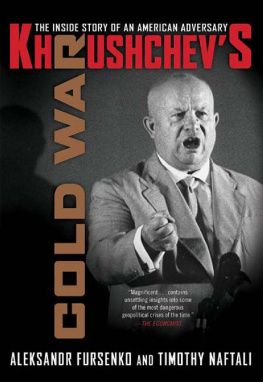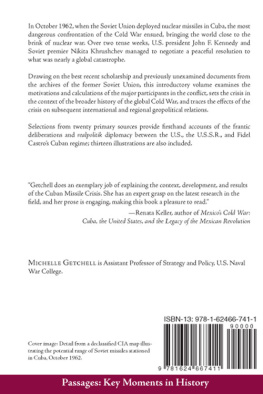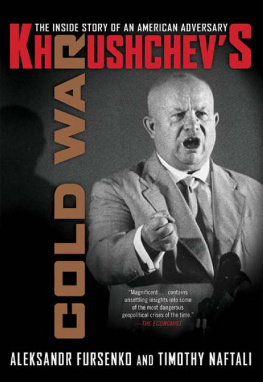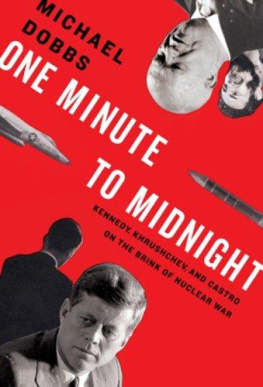One Hell of a Gamble
KHRUSHCHEV,
CASTRO,
AND
KENNEDY,
19581964
Aleksandr Fursenko and
Timothy Naftali

W. W. NORTON & COMPANY
NEW YORK LONDON
Images in this ebook are not displayed owing to permissions issues.
Contents
This book was made possible by a unique opportunity to study the most secret documents on the most dangerous moment of the Cold War. We wish to express our gratitude to the personnel of the Archive of the President of the Russian Federation (APRF), which contain the Politburo and Presidium records, to the curators of the papers of the Archive of the Foreign Intelligence Service of the Russian Federation (SVR), and the Intelligence Service of the General Staff of the Armed Forces of the Russian Federation (GRU), to the staff at the Russian Center for Storage of Contemporary Documentation (TsKhSD), the Records of the Historical Archival Center of the Ministry of Defense of the Russian Federation, and the Archive of the Ministry of Foreign Affairs of the Russian Federation (AVPRF). In the United States we received assistance from the John F. Kennedy Library, the National Archives, the Sterling Memorial Library at Yale University, the Houghton Library at Harvard University, the Richard M. Nixon Library and Birthplace, Yorba Linda, California, and the National Security Archive in Washington, D.C. In France, we are grateful to the staff at the Archives of the Ministre des Affaires Etrangres and, in the Czech Republic, to the staff of the Czech Foreign Ministry archives.
We enjoyed the sponsorship of many distinguished institutions. We are grateful to the Russian Academy of Sciences and its St. Petersburg Institute of Russian History, to the Kennan Institute for Advanced Russian Studies, Woodrow Wilson International Center for Scholars in Washington, D.C., to the Charles Warren Center for Studies in American History, Harvard University, La Maison des Sciences de lHomme in Paris, International Security Studies, Yale University, and the University of Hawaii at Manoa.
Many individuals have helped to make this book possible. Professors Ernest R. May, Idus A. Newby, and Arthur M. Schlesinger, Jr., provided valuable counsel and encouragement. We appreciated the assistance of Vitaly Afiani, Maurice Aymard, Charles Bartlett, Tom Blanton, Jim Blight, Paul Boccardi, McGeorge Bundy, Jutta Scherrer, Blair Ruble, Ann Carter-Drier, Sonia Colpart, Richard Helms, Frank Holeman, Susan Hunt, Will Johnson, Paul Kennedy, Brian Latell, Viktor Pleshkov and Vladimir Noskov, Inna Krupskaia and Antonina Tutova, Rudolph Pikhoia, Aleksandr Korotkov, Luis Rios, Warren Rogers, Sarah Stewart, Vladimir A. Vinogradov, Barbara Vandegrift, James OS. Wade, Mark Webber, Allen Weinstein, and Theodore Sorensen. In addition, Yuri Kobaladze, Oleg Tsarev, and Vladimir Karpov were very helpful. Very special thanks to Natalia Korsakova, whose invaluable support in archival research and in everyday work made possible the completion of the manuscript. We are grateful to Boris V. Ananich, Rafai Sh. Ganelin, Lindon Allin, Cicely Angleton, Barton Aronson, Pamela Auerbach, Esther Coopersmith, Ned Davis, Colby Devitt, Sonja Dumay, Robert Feldman, Joseph Ha, Sam Halpern, Hope M. Harrison, Elaine Hatfield, Frederick Holborn, Merrie and Rick Inderfurth, Zachary Karabell, Jessica Korn, Tom Knock, Anne Mark, Raymond and Gloria Naftali, Philip Nash, Leopoldo Nuti, Gilad Y. Ohana, Walter Pforzheimer, Richard Rapson, Karen Richardson, Gideon Rose, Brewer Stone, Edward Weismiller, Michael Yaffe, and Fareed Zakaria: friends who abetted one more retelling of the Cuban missile crisis.
We have the late John Costello to thank for introducing us. He initiated our collaboration as part of a major effort to open as many documents on the Cold War as possible in the years following the fall of the Berlin Wall. An untimely death prevented him from completing his own masterwork on Soviet-British relations with Oleg Tsarev. It was John Costello who introduced us to John Hawkins, whose wise counsel subsequently permitted us to navigate the shoals of the publishing world. To him, we are also deeply grateful.
Drake McFeely at Norton encouraged us with his enthusiasm for our topic and his deft use of the editors pen. Our debt to him is not merely professional. When a personal tragedy intervened, he displayed exceptional compassion.
In the final weeks of the project, Tims father died suddenly. We remember James D. Naftali as a close adviser and dear friend. Like John Costello, he understood the extraordinary nature of our collaboration and should have been able to see the final result.
The patience and support of our families has kept us going. We thank Aleksandrs wife, Natalia, and sons, Andrei and Sergei Fursenko, and Tims mother, Marjorie, and his sister, Debbie Naftali.
Finally, this book is dedicated to our teachers. Although from different generations and cultures, they shared a commitment to archival research and the careful reconstruction of the past. In the Stalin period, Boris Aleksandrovitch Romanov kept alive the spirit of independent inquiry by encouraging his students in Leningrad to follow documents wherever they might lead. In the 1980s, in Cambridge, Massachusetts, Ernest R. May challenged a new generation of graduate students to meet the high standard in international history that he had set with his multi-archival study of Woodrow Wilson and the American entry into the First World War.
Responsibility for any mistakes in our re-creation of the international politics of the early 1960s belongs to us alone. But, to the extent that we offer a new and persuasive understanding for this critical period, our work reflects the excellence of the scholarship we were exposed to as students.
For a generation of Americans and Russians, there was only one moment in the last half century when a third world war seemed possible. Americans of a certain age recall the flickering and foreshortened image of a handsome John F. Kennedy announcing that Soviet nuclear missiles were in Cuba, the reports of American jets and marines moving toward Florida, and the days of panic buying and uncertainty that ensued. Russians recall harrowing reports from Radio Moscow and the mobilization of the Soviet armed forces. For thirty-five years neither side has known how very close we actually came to a nuclear war in 1962.
On the night of October 22, hours before John Kennedy spoke to the world, the Kremlin indeed seriously considered using nuclear weapons on Americans. The appropriate orders were discussed, and the Soviet leader, Nikita Khrushchev, stayed the night in his office so that he would be able to cable these orders if they were necessary. At the same time 7,000 miles away the young American president, John Kennedy, was being lectured by senior members of the U.S. Congress who wanted him to invade the island of Cuba despite the presence of Soviet troops and nuclear weapons there. If we go into Cuba, Kennedy cautioned the congressional leadership, we have to all realize that we have taken the chance that these missiles, which are ready to fire, wont be fired. We are prepared to take it; but, the president noted, it would be one hell of a gamble.
The fall of the Berlin Wall in 1989 has opened a period of reexamination of the recent past not experienced since the intense debates of the 1920s over the causes of the First World War. It was only fifteen years ago that Ronald Reagan found the Cold War so threatening that he launched a crusade against the Soviet Union, and the world seemed to have entered another dangerous phase of a drama that had begun in 1946. Yet a decade later the Soviet Union was no more, communism was in retreat everywhere save China, and many people began to ask, What was the Cold War all about?
Next page
